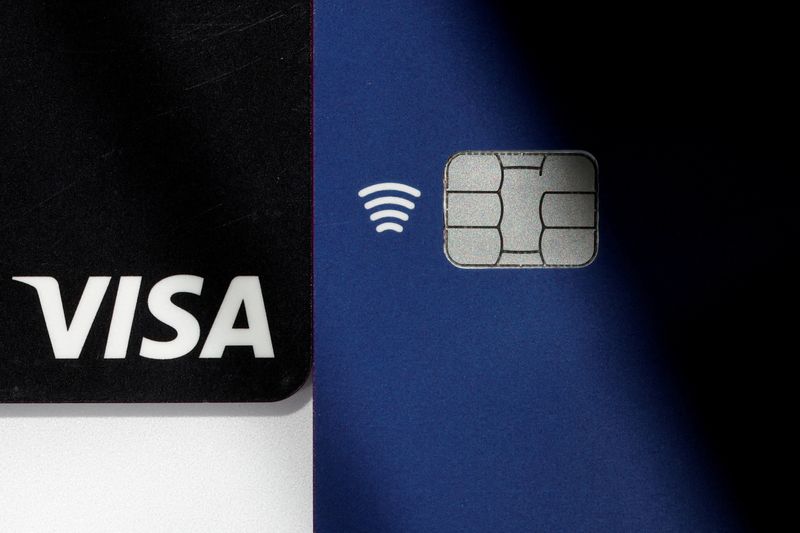By Jody Godoy
(Reuters) -Visa shares took a hit on Tuesday after the U.S. Department of Justice filed a lawsuit accusing it of violating antitrust law by suppressing competition by threatening merchants with high fees and paying off potential rivals.
Visa (NYSE:V), one of the world's largest payment networks, processes more than 60% of debit transactions in the U.S., bringing it $7 billion each year in fees collected when transactions are routed over its network, the Justice Department said. The company protects that dominance through agreements with card issuers, merchants, and competitors, prosecutors allege.
Visa shares closed down around 5.5% on Tuesday.
Julie Rottenberg, Visa's general counsel, said competition is thriving in the debit market, and that the claims are meritless and the company will contest them vigorously.
"When businesses and consumers choose Visa, it is because of our secure and reliable network, world-class fraud protection, and the value we provide," she said.
The bid to tackle the fees, sometimes known as swipe fees or interchange fees, is part of the Biden administration's efforts to combat rising consumer prices, a major issue in the Nov. 5 presidential election between Democrat Kamala Harris and Republican Donald Trump.
"Visa's unlawful conduct affects not just the price of one thing, but the price of nearly everything," Attorney General Merrick Garland said in a statement, noting merchants and banks pass payment network costs to consumers.
Visa's alleged anticompetitive conduct began around 2012, as competing companies entered the payments space following reforms that required card issuers to accommodate unaffiliated networks, a senior Justice Department official said.
Visa entered lucrative agreements with would-be financial technology competitors including Apple (NASDAQ:AAPL), PayPal (NASDAQ:PYPL) and Block Inc's Square that they would not release products that threatened its dominance, prosecutors alleged.
PayPal declined to comment on Tuesday. Apple and Block did not respond to requests for comment.
The card network also levies "staggering financial penalties" on merchants who do not route all or most eligible transactions through Visa's network, according to the lawsuit.
Prosecutors seek an order from a judge in Manhattan blocking Visa from imposing pricing structures that discourage competition, and paying rivals not to compete, which they said would restore competition for services to process debit payments both online and at physical stores.
The Justice Department's antitrust division began investigating Visa over its debit card practices in 2021, the same year it blocked Visa's acquisition of financial technology company Plaid. Rival Mastercard (NYSE:MA) said in April it was being investigated by the Justice Department as well.
Both companies have been in litigation for nearly two decades over their dominance in the cards market.
Visa and Mastercard agreed in 2019 to pay U.S. merchants $5.6 billion to settle damages claims in a class action lawsuit accusing them of anticompetitive practices.

A federal judge in Brooklyn rejected a parallel settlement in June that would reduce swipe fees by an estimated $30 billion over five years and require Visa and Mastercard to lift some rules that bar merchants from charging customers to use their cards.
Visa has set aside around $1.6 billion for potential settlements in those and other U.S. cases over interchange fees.